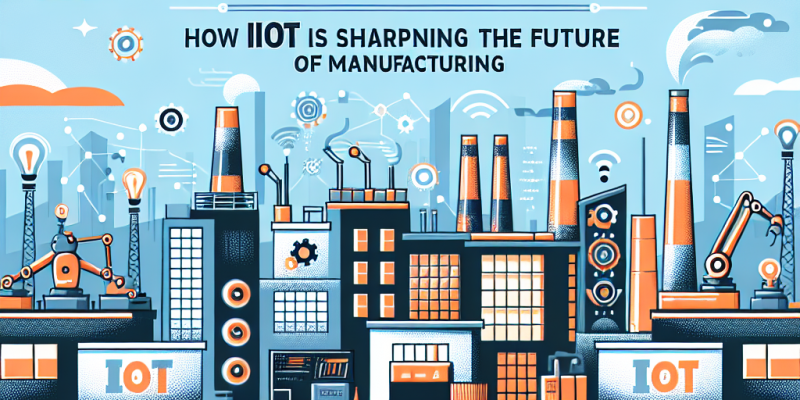Industry 4.0: How IoT is Shaping the Future of Manufacturing

Industry 4.0: How IoT is Shaping the Future of Manufacturing
The dawn of the fourth industrial revolution, commonly referred to as Industry 4.0, represents a major shift in the manufacturing sector, characterized by the seamless integration of Internet of Things (IoT) technologies with traditional manufacturing processes. This transformation is not just a technological upgrade; it embodies a new paradigm that enhances production efficiency, increases flexibility, and boosts economic output while ensuring sustainability.
Understanding Industry 4.0
Industry 4.0 is characterized by the fusion of the digital and physical worlds, enabling machines, systems, and humans to communicate and cooperate in real-time. This integration is driven primarily by advancements in IoT, artificial intelligence (AI), big data analytics, and cyber-physical systems. As manufacturers adopt these technologies, they are able to create "smart factories" that operate with unprecedented levels of automation, intelligence, and connectivity.
The Role of IoT in Manufacturing
At the heart of Industry 4.0 lies IoT, which refers to the interconnected network of devices that collect, exchange, and analyze data over the internet. In manufacturing, IoT plays a pivotal role in transforming operations across the production lifecycle, from supply chain management to maintenance and quality assurance. Here’s how IoT is influencing the future of manufacturing:
-
Enhanced Operational Efficiency:
IoT devices can monitor machinery and equipment in real-time, providing insights into their performance and health. Predictive maintenance models leverage this data to predict failures before they occur, reducing downtime and maintenance costs. For instance, sensors on factory equipment can provide alerts about abnormal vibrations or temperature spikes, allowing manufacturers to take proactive measures. -
Smart Supply Chain Management:
The integration of IoT in supply chain processes facilitates real-time tracking of inventory and shipments. Devices equipped with RFID tags and GPS can monitor products as they move through the supply chain, ensuring transparency and reducing the risk of stockouts or overstock situations. This level of visibility allows companies to make informed decisions, optimize their inventory levels, and improve customer satisfaction through timely deliveries. -
Increased Flexibility and Customization:
IoT enables manufacturers to respond to market demands more effectively. With the ability to collect and analyze data from various sources, manufacturers can better understand consumer preferences and adjust their production processes accordingly. Technologies such as 3D printing combined with IoT can facilitate mass customization, allowing companies to offer tailored products without sacrificing efficiency. -
Data-Driven Decision Making:
IoT generates vast amounts of data across the manufacturing process. By utilizing advanced analytics tools and AI, manufacturers can glean actionable insights from this data. This leads to informed decision-making, as companies can identify trends, anticipate market changes, and enhance their strategies. Data visualization tools can also improve transparency and communication within the organization. -
Improved Quality Control:
IoT devices can help maintain quality standards throughout the production process. Smart sensors monitor the manufacturing conditions—such as temperature, humidity, and pressure—ensuring that products are made under optimal conditions. In case of deviations from set parameters, immediate alerts can be sent to operators, ensuring corrective measures can be taken instantly. - Sustainability and Resource Management:
IoT technology plays a crucial role in promoting sustainability within the manufacturing sector. By using energy management systems and monitoring resource consumption in real-time, manufacturers can minimize their energy usage and waste. Furthermore, IoT enables manufacturers to implement circular economy principles, such as recycling and reusing materials more efficiently.
Challenges Ahead
Despite the vast potential of IoT in reshaping manufacturing, several challenges remain. Cybersecurity concerns are paramount as the increased connectivity of devices makes them more vulnerable to attacks. Additionally, the integration of IoT with legacy systems can be complex and often requires significant upfront investment.
Moreover, the workforce must be equipped with new skills to navigate and leverage these advanced technologies effectively. Companies must prioritize training and education to empower their employees and ensure they are prepared for the shifts that Industry 4.0 brings.
Conclusion
As Industry 4.0 continues to evolve, the influence of IoT will be a defining factor in the future of manufacturing. Companies that embrace these innovations stand to gain a competitive edge, enhancing their operational efficiencies while responding to the dynamic needs of the market. While challenges remain, the commitment to integrating IoT technologies is vital for manufacturers looking to thrive in an increasingly interconnected world. The future of manufacturing is not just about making products—it’s about making intelligent products in a smarter, more interconnected environment.













